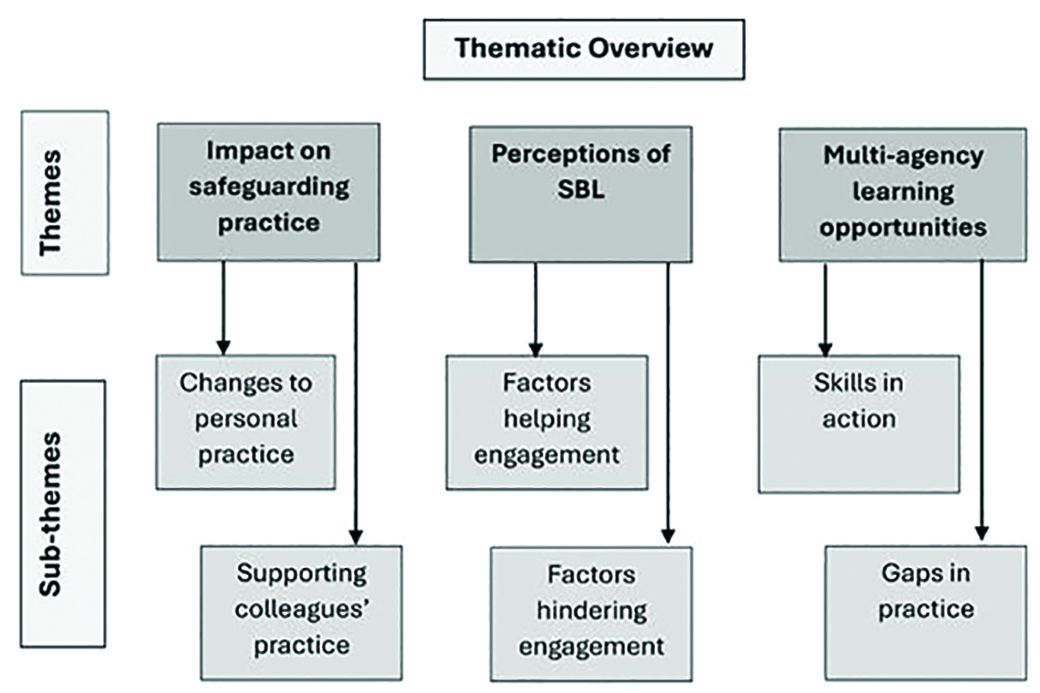
Keeping children safe - by identifying safeguarding risks and taking prompt action - is part of all healthcare professionals’ roles [1]. However, practitioners experience numerous internal and external barriers to acting on suspected neglect - thereby delaying initial safeguarding conversations with parents [2,3].
Traditional safeguarding training is largely theoretical in nature - focusing on protocol, professional roles, and the law. Given the complexity of situations when neglect occurs, practical skills in early engagement of parents in safeguarding conversations are essential for safer outcomes for children, as is supporting practitioners to identify barriers to action. This study explored participants’ experience of, and the learning acquired from, a multi-agency simulation training on early childhood neglect.
Practitioners (n=34) from Health, Education, Local Authority and Voluntary Sector services attended a one-day simulation course - ‘Strengthening Practice Around Early Neglect’ (SPAEN). This ran four times (May-July 2024).
Scenarios engaged a simulated parent and a baby manikin and demonstrated increasing levels of physical, emotional, medical and educational neglect over several months.
Course evaluation data was collected with pre-and post-questionnaires - exploring knowledge, confidence and attitudes - and an online evaluation form. Semi-structured interviews were conducted three months post-course.
Analysis of quantitative data was conducted using SPSS Statistics for Windows (v29), and themes and subthemes within the qualitative data were identified using thematic analysis.
Quantitative data (n=34) demonstrated statistically significant (p<0.05) increases in: knowledge of neglect assessment tools; strategies for initiating safeguarding conversations; and confidence in explaining the Early Help process to parents. Online evaluation (n=27) confirmed high levels of engagement in both simulation training (4.96/5, average Likert scores) and multi-agency discussions (4.92/5).
Three overarching themes were identified from the semi-structured interviews (n=6), Figure 1: Impact on personal and team safeguarding practice; Perception of simulation-based learning; and multi-agency learning opportunities. Sustained learning was reported, as were actions being taken to address gaps in practice across agencies following the training.
Multi-agency simulation training is an invaluable tool for exploring uncomfortable conversations around early neglect. Study data demonstrated increasing practitioner knowledge, confidence and attitudes for this complex work and may support earlier conversations around safeguarding concerns. Ongoing opportunities for experiential training of this kind, both at undergraduate and postgraduate levels, is needed to further improve safeguarding practice. These should remain multi-agency in nature wherever possible.
Future involvement of parents and young people would complement course design, bringing greater understanding of parents’ perspectives of uncomfortable safeguarding conversations.
As the submitting author, I can confirm that all relevant ethical standards of research and dissemination have been met. Additionally, I can confirm that the necessary ethical approval has been obtained, where applicable.
1. HM Government (2023). Working together to safeguard children 2023: a guide to multi-agency working to help, protect and promote the wellbeing of children. London: Crown.
2. Lines L, Hutton A. Constructing a Compelling Case: Nurses’ Experiences of Communicating Abuse and Neglect. Child Abuse Review 2021;30:332–46
3. Solem L, Diaz C, Hill L. A study of serious case reviews between 2016 and 2018: what are the key barriers for social workers in identifying and responding to child neglect? Journal of Children’s Services. 2020; 15(1):1–14.
This study was part-funded by an ASPiH 2024-2025 research grant.

